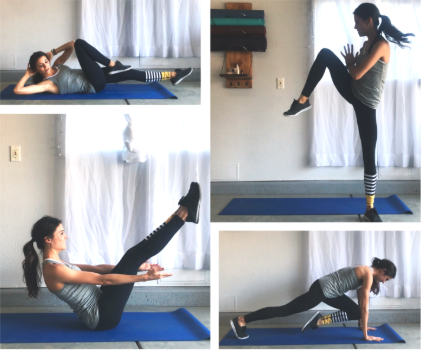30-Day Sleep Challenge
Objective: Enjoy life in a more fully rested state and all the TONS and TONS of benefits (see below) that come from proper sleep!
Why? Getting proper sleep is the most important thing you can do for your body each day. Proper sleep helps in all areas of life including physical, mental, and emotional.
Sleep is the foundation of a healthy life and an important factor to reaching every health goal, including weight loss. In fact, every health problem you may experience now or in the future is made worse by poor sleep and can be made better with proper sleep. Unfortunately most of us have accumulated some level of "Sleep Debt." The good news is we can pay off that sleep debt in the short-term and get back to normal.
Benefits of proper sleep include:
Why? Getting proper sleep is the most important thing you can do for your body each day. Proper sleep helps in all areas of life including physical, mental, and emotional.
Sleep is the foundation of a healthy life and an important factor to reaching every health goal, including weight loss. In fact, every health problem you may experience now or in the future is made worse by poor sleep and can be made better with proper sleep. Unfortunately most of us have accumulated some level of "Sleep Debt." The good news is we can pay off that sleep debt in the short-term and get back to normal.
Benefits of proper sleep include:
- Decreased risk of:
- Obesity
- Chronic diseases and death including, type 2 diabetes, heart disease, stroke, hypertension
- Inflammation
- Depression
- Improved:
- Brain function including memory, critical thinking, and concentration
- Mood
- Productivity
- Immune function
- Motor skills
- Sex Drive
- Muscle development
- And so much more!
Sleep Challenge Rules
Step 1: Determine "Sleep Need" and pay off "Sleep Debt"
Sleep needs differ depending on our age or stage of life, but most adults need between 7-9 hrs a night. Whatever your sleep need, you also likely have some sleep debt from missed sleep. The good news is you can pay off your short-term sleep debt and determine your ideal sleep need. At first it's not uncommon for people to sleep 8-12 hours (or more) at a time while they are paying off their sleep debt. But as your body catches up, that number will slowly go down until you reach your body's optimal sleep need. For most adults it's between 7-9 hrs, but there's exceptions to every rule. So you may need more or less (but people younger than 18 need more than 7-9). What's important is finding the right amount for your body. Once you've paid off your sleep debt you should feel fully rested after getting your daily sleep need. Let's get going:
Choose one of the two options below:
Our bodies are really smart and get into cycles...so picking a consistent cycle allows our body to tell us when to go to bed, and determine how much sleep we need. We could talk a lot more about it, but that's it in a nutshell. Consistency is good for sleep...and many other things.
Examples (these are just examples, feel free to pick a time that works best for you):
Step 2: Follow the rest of the Sleep Guidelines for 30 Days
Sleep Challenge Guidelines
Tracking Forms
Below this section you will find free tracking forms for you to download.
FAQs
Got other questions? Hit us up on Instagram with a comment or message.
Other Items
YOUR BODY KNOWS BEST, SO LISTEN TO IT
Luckily our bodies are amazing and were built with internal controls. We need to start listening to them. So above all else pay attention to your body because it knows best. Your body may not fit into the guidelines above exactly, and that's okay. The above guidelines will work for most people, but it's important that you find what works for you.
CONSULT WITH YOUR PHYSICIAN
We are not physicians and don't give medical advice. It's always a good idea to consult with your physician before starting any type of new program or challenge.
- Step 1:
- Determine your "Sleep Need"
- Pay off "Sleep Debt" until fully rested
- Step 2: Follow Sleep Guidelines Below for 30 Days
Step 1: Determine "Sleep Need" and pay off "Sleep Debt"
Sleep needs differ depending on our age or stage of life, but most adults need between 7-9 hrs a night. Whatever your sleep need, you also likely have some sleep debt from missed sleep. The good news is you can pay off your short-term sleep debt and determine your ideal sleep need. At first it's not uncommon for people to sleep 8-12 hours (or more) at a time while they are paying off their sleep debt. But as your body catches up, that number will slowly go down until you reach your body's optimal sleep need. For most adults it's between 7-9 hrs, but there's exceptions to every rule. So you may need more or less (but people younger than 18 need more than 7-9). What's important is finding the right amount for your body. Once you've paid off your sleep debt you should feel fully rested after getting your daily sleep need. Let's get going:
Choose one of the two options below:
- Option A: Consistent bedtime + Sleep in till you wake up
- Option B: Consistent wake time + Go to bed as soon as you're tired
Our bodies are really smart and get into cycles...so picking a consistent cycle allows our body to tell us when to go to bed, and determine how much sleep we need. We could talk a lot more about it, but that's it in a nutshell. Consistency is good for sleep...and many other things.
Examples (these are just examples, feel free to pick a time that works best for you):
- Option A: 10 pm bedtime every night + Sleep in till you wake up
- Option B: 6 am wake time + Go to bed as soon as you're tired
Step 2: Follow the rest of the Sleep Guidelines for 30 Days
Sleep Challenge Guidelines
- Sleep Need/Debt (see above for more details)
- Sleep Need: Sleep 7-9 hrs/night (or whatever your body needs to feel fully rested)
- Sleep Debt: Catch up on lost sleep until you wake each day feeling fully rested
- Pre-Sleep Routine
- Establish a relaxing bedtime routine
- Avoid caffeine, nicotine, and alcohol 2-3 hours before bedtime
- Avoid large meals 2-3 hours before bedtime (small snacks are okay)
- Reduce high fluid intake before bedtime
- Avoid bright lights 1 hour before bed (dim screen monitors on phones, tablets, etc.)
- Finish workouts 2-3 hours before bedtime
- Sleep Environment / Routine
- Stick to a consistent sleep schedule (your body gets into a cycle/rhythm)
- Make your sleep environment dark, quiet, and comfortable (use white noise if needed)
- Ensure your bed and pillow are comfortable to you
- Only use your bed for sleep and intimacy (banish TV and other electronics)
- Other Tips
- Exercise regularly, but finish workout 2-3 hours before bedtime
- If you struggle turning your brain off, journal or count backward
- If you can’t fall asleep after 20 minutes, get up and do something relaxing till tired
- Up to 30-minute naps are okay, unless you’re having trouble sleeping at night
- Shift-work and other situations may require adjustments to your routine
- If you’re still having trouble sleeping, consult a professional
Tracking Forms
Below this section you will find free tracking forms for you to download.
FAQs
- Will sleeping in on the weekend mess up my sleep cycles? If you are consistently waking up at the same time every morning on most days it may be hard to sleep in past that time. If it isn't, and your body will let you sleep in, do it! Take advantage of the opportunity to catch up. This likely means you've got some serious sleep debt to pay off. As you get closer and closer to your fully rested state, it may help to stay closer to your consistent schedule (and will likely be harder to sleep in, because your body won't need as much sleep). But for now get the extra sleep if you can.
- I've been tired most my life, is it possible to pay off all my sleep debt going back years? While you can pay off sleep debt in the short-term, it's unlikely you can pay off long-term sleep debt. So just focus on the now and getting yourself to a rested state today and in the future.
- I am sleeping 7-9 hrs a night but still waking up tired, what's wrong? There's a number of reasons this might be happening. The most common is you still have sleep debt you need to pay off. It could be you need more than 9 hrs/night. Another reason is your sleeping, but not getting restful/deep sleep. In that case ensure you are following all the Sleep Guidelines below. For example, if you're a light sleeper you should sleep with a fan or white noise (there's free apps). Pay attention to light. Is your room dark the entire time you're sleeping? For example, if you are trying to sleep after the sun is up and you aren't blocking out the sun light with shades, then your body can perceive even small amounts of light coming through which then causes it to start waking up. Are you on your phone or tablet right before bed, or watching TV? The light from those devices also prevents your brain from shutting off. These are just a few examples, but take a look at all the sleep guidelines.
Got other questions? Hit us up on Instagram with a comment or message.
Other Items
YOUR BODY KNOWS BEST, SO LISTEN TO IT
Luckily our bodies are amazing and were built with internal controls. We need to start listening to them. So above all else pay attention to your body because it knows best. Your body may not fit into the guidelines above exactly, and that's okay. The above guidelines will work for most people, but it's important that you find what works for you.
CONSULT WITH YOUR PHYSICIAN
We are not physicians and don't give medical advice. It's always a good idea to consult with your physician before starting any type of new program or challenge.
Tracking Forms
Download the file below to access the tracking forms for the 30 Day Sleep Challenge. It's free! :)
| 30daysleepchallengetrackingforms.pdf |
Good Sleep is a great start to reaching your health goals...let's keep it going! Try one of our programs below.
"The Simple Fast"Being healthy is challenging these days. For that reason, we've made it as simple and easy as we know how.
Our program:
Click HERE to find out more. |
"LifestyleHealth12"LifestyleHealth12 program is a 12-week comprehensive step-by-step health program and includes over 140 pages with:
Click HERE to find out more. |
"Yoga Strong"'Yoga Strong' eBook - Building strength through yoga and meditation.
Includes yoga with weights, cardio yoga, and a silent, self-guided meditation. Written by Jessica Millar @Mommy.Yoga Click HERE to find out more. |






